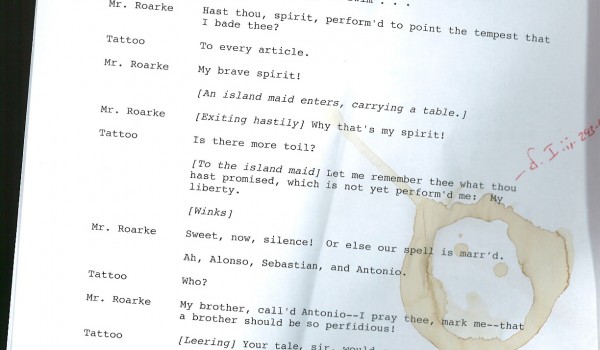What song immediately transports you to a picturesque Austrian mountainside, filled with singing nuns, adorable children, and a captivating love story? For many, the answer is “The Sound of Music,” an enduring masterpiece that has touched hearts for generations. But beyond the iconic songs and charming characters lies the meticulously crafted script that brought this beloved story to life. This article delves into the fascinating world of the “The Sound of Music” drama script, exploring its genesis, its evolution, and its enduring impact on both stage and screen.

Image: www.loadsofmusic.com
The “The Sound of Music” drama script wasn’t born overnight. It began as a 1959 memoir titled “The Story of the Trapp Family Singers” by Maria Augusta Trapp, a former governess to the seven children of the widowed Austrian naval captain, Georg von Trapp. Richard Rodgers and Oscar Hammerstein II, the famous songwriting duo, were captivated by the story and saw its potential for a triumphant musical. They worked tirelessly to adapt the memoir into a captivating theatrical production, incorporating elements of Maria’s real-life experiences with the von Trapp family, the pre-World War II political climate in Austria, and the family’s eventual escape from the Nazi regime.
From Stage to Screen: The Evolution of the Script
The Broadway Debut: A Triumphant Premiere
The theatrical debut of “The Sound of Music” on Broadway in 1959 was a resounding success. The play was infused with Rodgers and Hammerstein’s signature blend of captivating melodies, emotionally resonant lyrics, and a heartwarming story. The script’s careful integration of music and dialogue effectively conveyed the emotional complexities of Maria’s journey – from her initial naivete and yearning for a life beyond the convent to her burgeoning love for Georg and her courageous decision to stand with him against the Nazi threat. Audiences were swept away by the poignant and powerful narrative, leaving the theater humming the iconic tunes and feeling a profound sense of connection to the characters.
The Cinematic Adaptation: A Global Phenomenon
The success of “The Sound of Music” on Broadway paved the way for a cinematic adaptation. The film, released in 1965, became a global phenomenon, solidifying its place as one of the most successful musicals of all time. This adaptation, directed by Robert Wise, faithfully captured the essence of the original script while introducing new elements to further enhance the storytelling. The film’s breathtaking cinematography, utilizing stunning shots of the Austrian Alps, amplified the beauty and grandeur of the setting. This visual splendor added another layer to the narrative, complementing the emotional impact of the songs and dialogue.

Image: www.kierenmacmillan.info
Key Elements of the Script: A Detailed Exploration
Examining the “The Sound of Music” drama script reveals a masterfully crafted story that captivates audiences on multiple levels. The script’s strengths lie in its skillful blending of humor, drama, and romance.
- The Character of Maria: Maria, the young postulant nun who becomes the governess of the von Trapp children, is a relatable character who evokes both empathy and admiration. Her struggles with her vocation, her newfound love for Georg, and her courage in the face of adversity resonate deeply with audiences. The script’s meticulous attention to her character arc allows viewers to witness her growth and transformation.
- The Love Story: The budding romance between Maria and Georg von Trapp is one of the script’s central themes. The screenplay expertly builds tension and anticipation, showcasing the gradual blossoming of their affection for one another. The script’s careful pacing underscores the complexities of their relationship—from Maria’s initial apprehension about Georg’s sternness to her eventual acceptance of his love and commitment.
- The Music’s Role: The music in “The Sound of Music” is not simply a backdrop; it’s an integral part of storytelling. The songs drive the emotional core of the narrative. The script seamlessly integrates song and dialogue, using music to express unspoken emotions, reveal hidden truths, and propel the action forward.
- The Historical Context: The musical set in Austria’s pre-World War II era serves as a powerful reminder of the historical events that shaped the story. The script’s nuanced portrayal of the escalating Nazi threat adds depth to the narrative and enhances the emotional impact of the von Trapp family’s decision to flee Austria. The script’s balanced portrayal of both the beauty of Austrian culture and the rising threat of Nazism creates a compelling backdrop for the family’s story.
Enduring Impact: The Legacy of “The Sound of Music”
The “The Sound of Music” drama script’s enduring popularity is a testament to its powerful storytelling, unforgettable melodies, and timeless themes. The musical has touched generations, inspiring countless audiences with its messages of love, family, and courage in the face of adversity. The script’s themes of finding one’s voice, embracing life’s challenges, and the importance of standing up for what’s right continue to resonate today, making “The Sound of Music” a truly timeless story.
Beyond stage and screen, the impact of “The Sound of Music” can be seen in countless other forms of entertainment. From countless adaptations in various languages, theatrical productions worldwide, and even a theme park attraction at Universal Studios Hollywood, the musical continues to capture imaginations and entertain audiences of all ages.
The Sound Of Music Drama Script
Conclusion: A Timeless Masterpiece
“The Sound of Music” is more than just a musical; it’s a testament to the power of storytelling and the enduring impact of music on the human heart. The meticulously crafted script has captured audiences for decades, proving its timeless appeal. Its ability to evoke laughter and tears, to resonate with audiences on both an emotional and historical level, makes “The Sound of Music” a true masterpiece. So, the next time you hear the familiar strains of “Do-Re-Mi” or “My Favorite Things,” take a moment to appreciate the power of the script that brought this beloved story to life.






